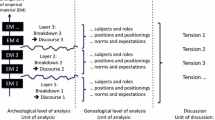Abstract
Dialogues between companies and actors of society often start as a result of a public scandal or in a situation of crisis. They can lead to short-term public relations activism or to long-term reputation gains. On the basis of cases and of a typology of forms of dialogues, the author develops ethical criteria and conditions for a successful dialogue – the ethical basis for such criteria being values such as equality, freedom and participation. A special focus is put on challenges that often result from dialogues such as the ethical judgment of compromises. This article proposes ethical criteria to evaluate compromises. This leads to a model of ethical dialogue.
Similar content being viewed by others
References
Berndt, M. & Sack, D. (eds.): 2001, Global Governance? Voraussetzungen und Formen demokratischer Beteiligung im Zeichen der Globalisierung (Westdeutscher Verlag, Opladen).
Bezuidenhout, A., Fig, D., Hermann, R., Omar, R.: 2007, Political Economy, in Fig, David (ed.): Staking their Claims. Corporate Social and Environmental Responsibility in South Africa, University of KwaZulu-Natal Press, South Africa, pp. 13-94.
Bornstein, D.: 2004, How to Change the World. Social Entrepreneurs and the Power of New Ideas (Oxford University Press, Oxford).
Buber, M.: 1923, I and Thou (T.&T. Clark, Edinburgh, first German edition 1923)
Buber, M.: 1979, Das Dialogische Prinzip (Lambert Schneider,, Heidelberg), 4th ed.
ECOSOC (UN Department of Economic and Social Affairs): 2002, ‘Multi-Stakeholder Dialogues: Learning from the UNCSD Experience’, Background Paper No. 4, DESA/DSD/PC3/BP4
Etzioni, A.: 1996, The New Golden Rule. Community and Morality in a Democratic Society (Perseus Books, New York).
Fitzpatrick, K. & Gauthier, C. (2001). Toward a Professional Responsibility Theory of Public Relations Ethics, Journal of Mass Media Ethics, 16 (2/3), pp. 193-212.
Freeman, R.E., Harrison, J. & Wicks, A.C.: 2007, Managing for Stakeholders (Yale University Press, Yale).
Freire, P.: 1970, Pedagogy of the Oppressed (Seabury Press, New York).
Goldschmidt, H. L.: 1976, Freiheit für den Widerspruch (Schaffhausen)
Greenwood, M.: 2007, ‘Stakeholder engagement: beyond the myth of corporate responsibility’, Journal of Business Ethics, 74, 4, 315-327.
Habermas, J.: 1985, The Theory of Communicative Action (Beacon Press, first german edition 1981).
Hadsell, H. and Ch. Stückelberger: 2009, Overcoming Fundamentalism. Ethical Responses from Five Continents (Globethics.net, Nairobi), pp. 11, 20.
Illinois Institute for Technology: 2008, Center for the Study of Ethics in the Professions. A large collection of over 850 professional codes of ethics. http://ethics.iit.edu/codes/. Accessed 2 Dec 2008
Jenkins, R.: 2002, Corporate Codes of Conduct: Self-Regulation in a Global Economy, in Voluntary Approaches to Corporate Responsibility. Reading and a Resource Guide (NGLS UNRISD, Geneva), pp. 1–60
Klempner, G.: 1998, ‘The Ethics of Dialogue’, Paper given at the Shap Conference, Philosophical Society of England, 26 February 1998. http://klempner.freeshell.org/articles/dialogue.html. Accessed 13 April 2008
Maak, Th. and P. Ulrich: 2007, Integre Unternehmensführung. Ethisches Orientierungswissen für die Wirtschaftspraxis (Schäfer-Poeschel Verlag, Stuttgart), pp. 169–204 on “Stakeholder-Engagement & -Dialog”
Nicolson, R. (ed.).: 2008, Persons in Community. African Ethics in a Global Culture (University of KwaZulu-Natal Press, South Africa). Especially Introduction 1–15. See also the article by David Lutz in this Special Issue
Peter, H.-B. and D. Loosli: 2004, Les relations de la Suisse avec l’Afrique du Sud. Perspectives d’éthique sociale (Etudes et Rapports 59 de l’Institut d’éthique sociale de la FEPS, Bern)
Philipps, R.: 2003, Stakeholder Theory and Organizational Ethics (Berrett-Koehler Publishers).
Rawls, J.: 2001, Justice as Fairness: A Restatement, ed. by Erin Kelly (The Belknap Press of Harvard University Press, Cambridge, MA)
Stückelberger, Ch.: 1988, Vermittlung und Parteinahme. Der Versöhnungsauftrag der Kirchen in gesellschaftlichen Konflikten (Theologischer Verlag, Zürich).
Stückelberger, Ch.: 2001, ‘Les valeurs fondamentales du commerce équitable et durable’, in Le commerce durable. Vers de plus justes pratiques commerciales entre le Nord et le Sud (IUED, Geneva), pp. 75–96
Stückelberger, Ch.: 2002, Global Trade Ethics. An Illustrated Overview (WCC Publications, Geneva)
Stückelberger, Ch. & Mathwig, F.: 2007, Grundwerte. Eine theologisch-ethische Orientierung (Theologischer Verlag, Zürich).
Stückelberger, Ch. & Mugambi, J.N.K, eds.: 2007, Responsible Leadership. Global and Contextual Ethical Perspectives (Globethics.net/WCC, Geneva).
Ucko, H. (ed.) with C. Venema and A. Hentsch: 2006, Changing the Present, Dreaming the future. A Critical Moment in Interreligious Dialogue (WCC Publications, Geneva)
Utting, P.: 2002, Regulating Business via Multi-stakeholder Initiatives: A preliminary Assessment, in NGLS UNRISD: Voluntary Approaches to Corporate Responsibility (UN NGLS, Geneva), pp. 61-130.
WBCSD (World Business Council for Sustainable Devel- opment): 2001, Stakeholder Dialogue. The WBCSD’s approach to engagement (WBCSD, Geneva). http://www.wbcsd.org. Accessed 13 April 2008
Weber-Berg, Ch.: 2004, Salz der Erde oder Spiegel der Gesellschaft? Studie betreffend der Haltung des SEK im Kontext der “Bankengespräche” zum Thema Apartheid in den Jahren 1986-1989, ITE-Verlag, Bern.
World Council of Churches/All Africa Council of Churches: 1996, Ogoni. The struggle continues (WCC Publications, Geneva).
Zürcher, L.: 2008, Good Offices in South Africa. The South Africa policy of the Federation of Swiss Protestant Churches between 1970 and 1990 (FSPC, Bern).
Author information
Authors and Affiliations
Corresponding author
Rights and permissions
About this article
Cite this article
Stückelberger, C. Dialogue Ethics: Ethical Criteria and Conditions for a Successful Dialogue Between Companies and Societal Actors. J Bus Ethics 84 (Suppl 3), 329–339 (2009). https://doi.org/10.1007/s10551-009-0201-2
Published:
Issue Date:
DOI: https://doi.org/10.1007/s10551-009-0201-2




